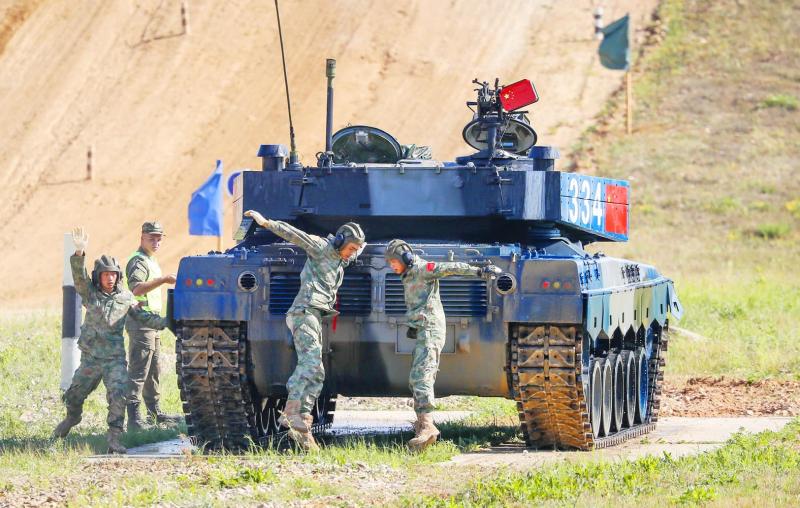Chinese troops are planning to travel to Russia to take part in joint military drills, the Chinese Ministry of National Defense said on Wednesday.
Beijing and Moscow have close defense links, and China has said that it wants to push bilateral relations “to a higher level,” even as Moscow faces international sanctions and widespread condemnation over its war in Ukraine.
The ministry said China’s participation in the annual “Vostok” exercises — which Moscow has said would take place from Saturday to Sept. 5 — is part of a bilateral cooperation agreement with Russia.

Photo: EPA-EFE
“The aim is to deepen practical and friendly cooperation with the armies of participating countries, enhance the level of strategic collaboration among the participating parties and strengthen the ability to respond to various security threats,” the ministry said in a statement.
India, Belarus, Mongolia, Tajikistan and other countries would also participate, it said.
China and India have been accused of providing diplomatic cover for Russia throughout its months-long war in Ukraine by opposing Western sanctions and arms sales to Kyiv.
However, Beijing said its participation in the joint exercises was “unrelated to the current international and regional situation.”
It is the second joint exercise conducted by Chinese and Russian troops this year. Bombers from the countries conducted a 13-hour drill close to Japan and South Korea in May, forcing those countries to scramble fighter jets as US President Joe Biden was visiting Tokyo.
US Department of State spokesperson Ned Price said that while warming ties between China and Russia undermined global security, Washington did not “read anything” into the drills.
“Most of the participating countries also routinely participate in a wide array of military exercises and exchanges with the United States as well,” he told a news conference.

INVESTIGATION: The case is the latest instance of a DPP figure being implicated in an espionage network accused of allegedly leaking information to Chinese intelligence Democratic Progressive Party (DPP) member Ho Jen-chieh (何仁傑) was detained and held incommunicado yesterday on suspicion of spying for China during his tenure as assistant to then-minister of foreign affairs Joseph Wu (吳釗燮). The Taipei District Prosecutors’ Office said Ho was implicated during its investigation into alleged spying activities by former Presidential Office consultant Wu Shang-yu (吳尚雨). Prosecutors said there is reason to believe Ho breached the National Security Act (國家安全法) by leaking classified Ministry of Foreign Affairs information to Chinese intelligence. Following interrogation, prosecutors petitioned the Taipei District Court to detain Ho, citing concerns over potential collusion or tampering of evidence. The

‘FORM OF PROTEST’: The German Institute Taipei said it was ‘shocked’ to see Nazi symbolism used in connection with political aims as it condemned the incident Sung Chien-liang (宋建樑), who led efforts to recall Democratic Progressive Party (DPP) Legislator Lee Kun-cheng (李坤城), was released on bail of NT$80,000 yesterday amid an outcry over a Nazi armband he wore to questioning the night before. Sung arrived at the New Taipei City District Prosecutors’ Office for questioning in a recall petition forgery case on Tuesday night wearing a red armband bearing a swastika, carrying a copy of Adolf Hitler’s Mein Kampf and giving a Nazi salute. Sung left the building at 1:15am without the armband and apparently covering the book with a coat. This is a serious international scandal and Chinese

Seventy percent of middle and elementary schools now conduct English classes entirely in English, the Ministry of Education said, as it encourages schools nationwide to adopt this practice Minister of Education (MOE) Cheng Ying-yao (鄭英耀) is scheduled to present a report on the government’s bilingual education policy to the Legislative Yuan’s Education and Culture Committee today. The report would outline strategies aimed at expanding access to education, reducing regional disparities and improving talent cultivation. Implementation of bilingual education policies has varied across local governments, occasionally drawing public criticism. For example, some schools have required teachers of non-English subjects to pass English proficiency

TRADE: The premier pledged safeguards on ‘Made in Taiwan’ labeling, anti-dumping measures and stricter export controls to strengthen its position in trade talks Products labeled “made in Taiwan” must be genuinely made in Taiwan, Premier Cho Jung-tai (卓榮泰) said yesterday, vowing to enforce strict safeguards against “origin laundering” and initiate anti-dumping investigations to prevent China dumping its products in Taiwan. Cho made the remarks in a discussion session with representatives from industries in Kaohsiung. In response to the US government’s recent announcement of “reciprocal” tariffs on its trading partners, President William Lai (賴清德) and Cho last week began a series of consultations with industry leaders nationwide to gather feedback and address concerns. Taiwanese and US officials held a videoconference on Friday evening to discuss the